Coral Restoration
How Marine-Life Health Impacts The Entire Caribbean
A major factor of food security in St Vincent and the Grenadines hinges on the health of local coral reef ecosystems. Coral reefs house many marine creatures that sustain the local environment and make up a major part of the local Vincentian diet. Plus, the country’s economy is heavily dependent on tourism and again, a healthy marine ecosystem is important to that tourism.
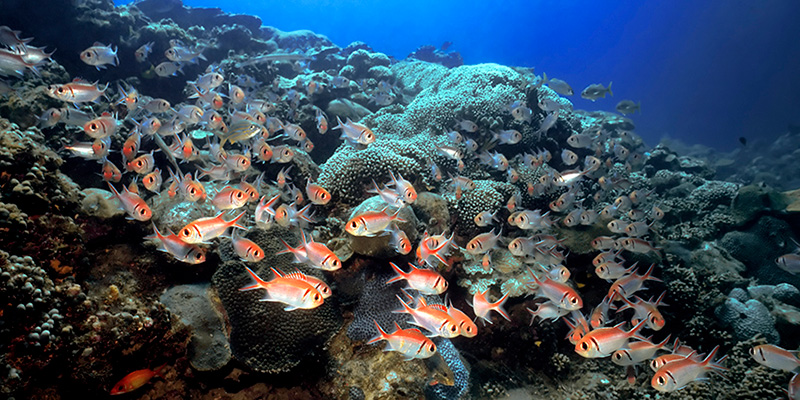
However, factors like invasive species, local pollution, acidic water, and warmer weather caused by global climate change have all taken a disastrous toll on marine life. Over 50% of coral reefs in the Caribbean have already been lost.
That’s why Richmond Vale Academy, together with the community, aids in one of the largest Marine Conservation programs in the region. The program trains 16 volunteering Vincentians to become coral reef gardeners and stewards of the marine environment. With an emphasis on protecting not only coral nurseries, but also the coastline, this
ambitious program is a holistic approach to reversing the negative effects climate change has on the islands.
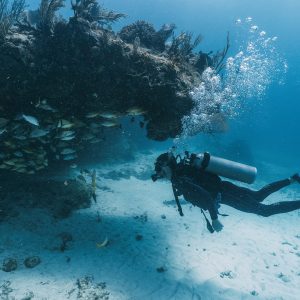
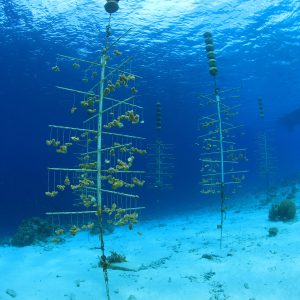
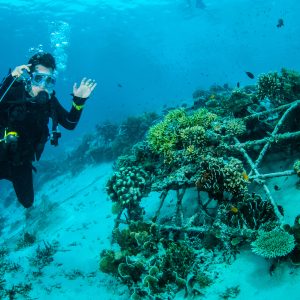
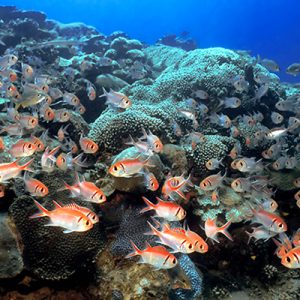
Our Reach
The Coral Restoration program strives to propagate 10,000 elkhorn corals and 30,000 staghorn corals. Once completed, there will be about 40 hectares of new coral reefs stretching over 70 miles between the country of St. Lucia and the Saint Vincent island of Petit Saint Vincent.
Progress on this project slowed down significantly after the April 2021 La Soufriere Volcano eruption. But together with students, Richmond Vale Academy has played a significant role in pushing forward to make this project a success. During their program, students of Richmond Vale Academy can expect to learn more about the importance of coral reefs and their pivotal role in the local ecosystem and on climate change.
One of the biggest dangers to the Caribbean coral reefs is the invasive lionfish. Because of its high appetite, fast breeding cycle, and lack of natural predators, the lionfish poses one of the greatest threats to local marine life.
In 2015, Richmond Vale Academy took a proactive approach to the situation by establishing a diving center. Since opening, over 150 certifications have been issued for Open Water, Advanced Open Water, Rescue Diver, and Dive Master. With these newly certified divers, over three years, Richmond Vale Academy orchestrated strategized hunts to lower the population of lionfish.
With continual lionfish removal success, the lionfish harvested during these hunts have become a healthy staple in Richmond Vale Academy meals.
Coral Restoration Partners
The Coral Restoration project has three partners, Centre for Livelihoods, Ecosystems, Energy, Adaptation and Resilience – St. Lucia (CLEAR St. Lucia); Sustainable Grenadines (SusGren); and Richmond Vale Academy.
CLEAR St. Lucia has completed coral reef nurseries in both Petit St. Vincent and St. Lucia already. They continue to provide training for Richmond Vale Academy and SusGren. The program is funded by the Caribbean Biodiversity Fund.
Training regulations are provided by the Caribbean Community (CARICOM). Vocational qualifications in coral restoration as well as other standard scientific manuals, including diving manuals are provided by the Professional Association of Diving Instructors (PADI) or the Professional Scuba Schools (PSS).

